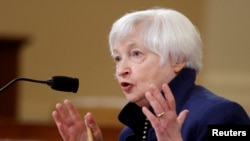"Our greatest challenge today comes from Russia's illegal and unprovoked war against Ukraine," U.S. Treasury Secretary Janet Yellen said ahead of a meeting between finance ministers from the G20 world's top economies and central bank governors on Friday and Saturday.
"We are seeing negative spillover effects from that war in every corner of the world, particularly with respect to higher energy prices, and rising food insecurity," she added.
"The international community must be clear-eyed about holding Putin accountable for the global economic and humanitarian consequences of his war."
Yellen said she will continue to press G20 allies at the meeting for a price cap on Russian oil to choke off Putin's war chest and pressure Moscow to end its invasion while bringing down energy costs.
"A price cap... is one of our most powerful tools to address the pain that Americans and families across the world are feeling at the gas pump and the grocery store," she said.
She expressed hope that India and China would join such a cap, saying it "would serve their own interests" to put downward pressure on prices for consumers globally.
But she refused to be drawn on whether Western officials will stage a multi-nation walkout when Russian officials speak, as they did at a G20 meeting in Washington in April.
"It cannot be business as usual," she said. "I can tell you that I can certainly expect to express in the strongest possible terms my views on Russia's invasion... to talk about its impact on Ukraine and the entire global economy and to condemn it."
"I expect that many of my colleagues will do the same."
Yellen's comments echo the head of the International Monetary Fund, who said Wednesday that the global economic outlook had "darkened significantly" because of Moscow's invasion, just months after it revised down its global growth forecast for 2022 and 2023.
The IMF is "projecting a further downgrade to global growth" in 2022 and 2023, Kristalina Georgieva said in a blog post published ahead of this weekend's meeting.
The risk of "social instability" was also increasing because of rising food and energy prices, she wrote.
But there was substantive progress made in attempts to break the impasse on Wednesday after Russia and Ukraine met in Turkey for their first direct talks since March on a deal to relieve the food crisis caused by blocked Black Sea grain exports.
UN Secretary General Antonio Guterres called it a "ray of hope to ease human suffering and alleviate hunger around the world" ahead of another planned round of talks next week.
.






